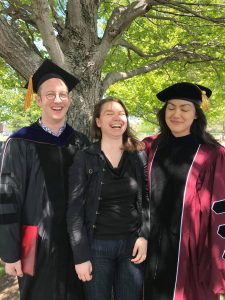On Thursday, Sandy Chung, Matt Wagers, Jed Pizarro-Guevara, Jake Vincent, and Richard Bibbs were at Academia Sinica in Taipei, Taiwan, for the 25th Annual Meeting of the Austronesian Formal Linguistics Association. They report a collegial environment to exchange ideas and nerd out on anything Austronesian.
Sandy and Matt opened the conference on Thursday with an invited talk about resumptive pronouns in Chamorro and Palauan. They argue that in both languages, resumptive pronouns arise in two ways: one that is licensed by the grammar, and another that is produced outside the grammar.
Jed (joint work with Matt) presented experimental evidence for an asymmetry in the extraction-restriction in Tagalog, and proposed that the results could be reframed as two grammars in competition. He provides computational evidence consistent with a two-grammar hypothesis.
The first day ended with a bang—with a Chinese lauriat, a multi-course meal that seemed endless! Especially noteworthy is the soup called “Buddha jumps over the wall”.
On Friday, former banana slug Eric Potsdam (University of Florida) opened the second day with an invited talk about ellipsis in Malagasy.
Later that day, Jake gave a presentation about the encoding of sentential negation in Chamorro and how phrases exhibiting negative concord might be licensed. He focused on explaining the inability for subjects to either signal sentential negation or exhibit negative concord without undergoing focus movement to Spec, CP.
Finally, Richard presented on an agentive nominalizing morpheme in Chamorro. He claimed that the morpheme is a reduplicant, and proposed a markedness analysis accounting for why the vowel of the reduplicant surfaces as non-identical to the vowel in the base.
Richard, Jake, and Jed enjoyed the company of new friends and old. Night markets, festival for a sea goddess, delicious oolong tea, craft cocktails, karaoke, and efficient public transportation were some of the things in Taiwan that they really appreciate. They can’t wait to be back! Pictured (left to right): Richard Bibbs, Jake Vincent, Eric Potsdam, Sandy Chung, Matt Wagers, Jed Pizarro-Guevara
Pictured (left to right): Richard Bibbs, Jake Vincent, Eric Potsdam, Sandy Chung, Matt Wagers, Jed Pizarro-Guevara

 Pictured (left to right): Richard Bibbs, Jake Vincent, Eric Potsdam, Sandy Chung, Matt Wagers, Jed Pizarro-Guevara
Pictured (left to right): Richard Bibbs, Jake Vincent, Eric Potsdam, Sandy Chung, Matt Wagers, Jed Pizarro-Guevara